Daniel’s Journey to Íle Idjwi in 2021
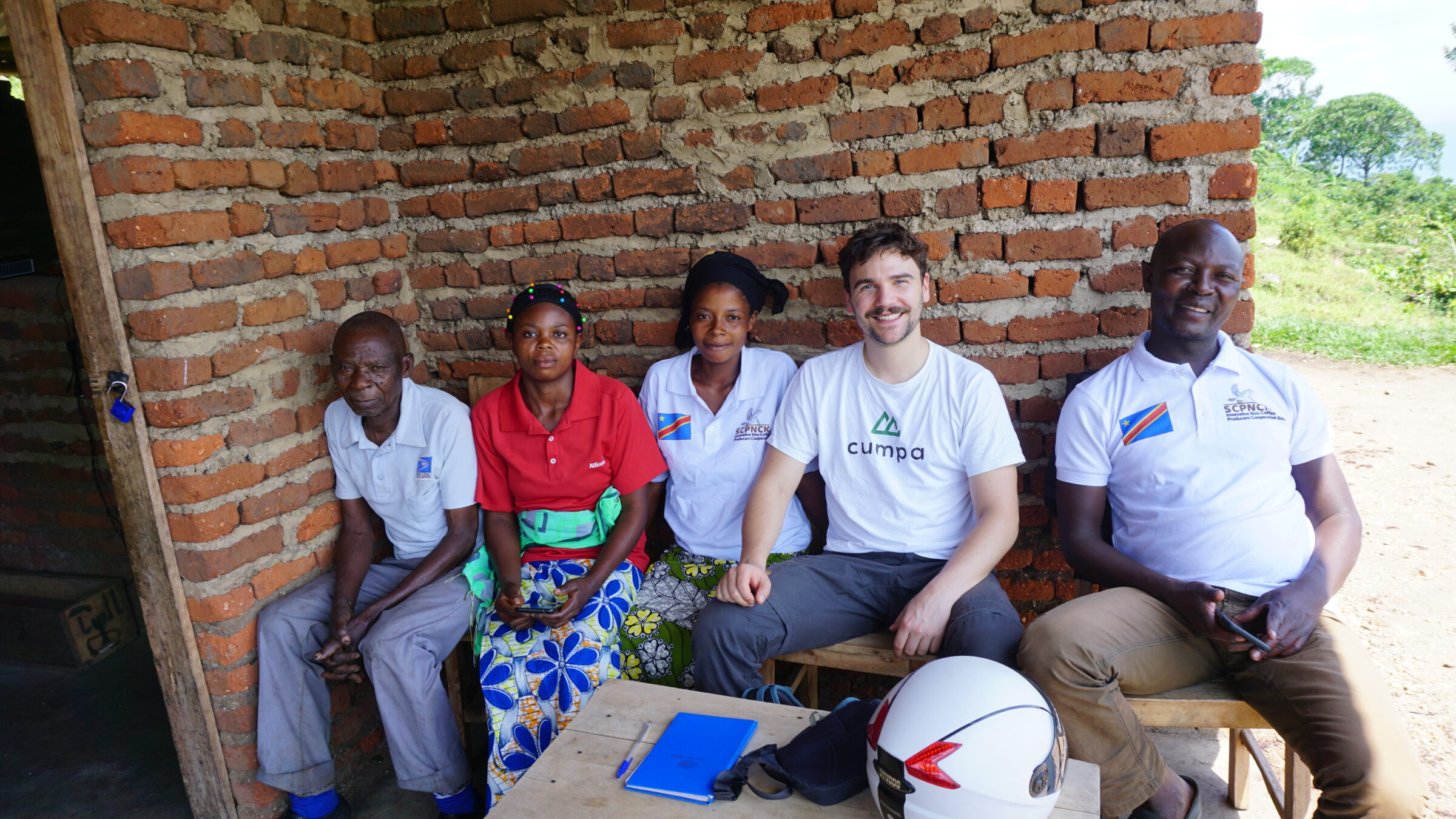
A travel journey by Daniel Kraus, Co-Founder and Shareholder at cumpa GmbH
The Journey through Rwanda
Lukas and I had been dreaming since 2018 in Karlsruhe about importing coffee from the island of Idjwi. After Lukas’ trip in 2020 was canceled due to the pandemic, I seized the opportunity to visit Idjwi in 2021. The journey began in November 2021. The journey went through Rwanda, where I was able to stay in a hostel with “Engineers without Borders” after we arrived on the same flight. While the Engineers without Borders members made their final purchases, I arranged for a driver to take me to Lake Idjwi. The half-day drive from Kigali to Kibuye was pleasant as the connecting road was paved for the most part. My driver, Bosco, was calm and friendly, spoke perfect English, and made the journey enjoyable. Kibuye is located on the Rwandan side of Lake Kivu. As we approached the small town, the vast Lake Kivu opened up before us.
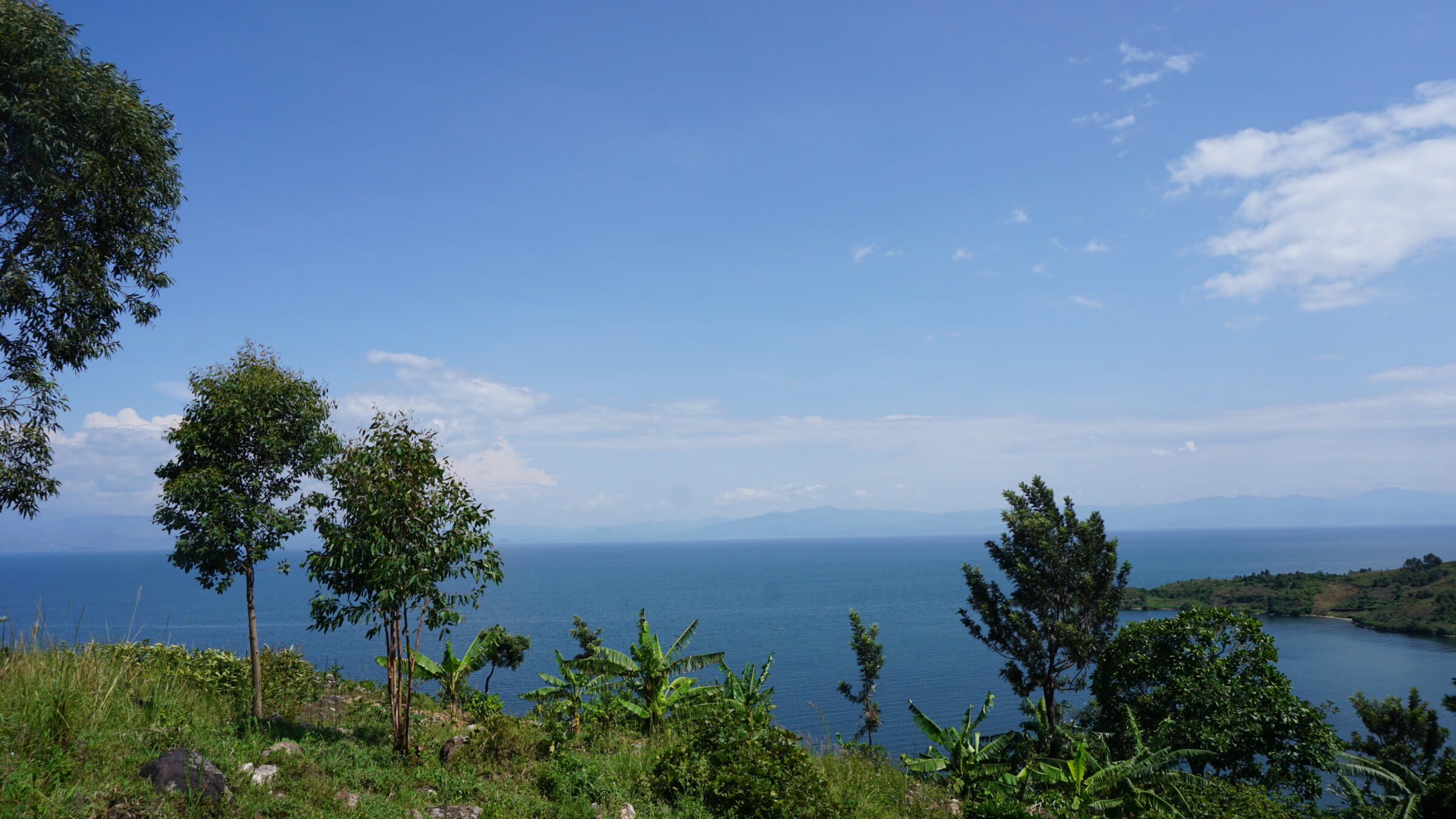
In Kibuye, Gilbert Makele, the managing director of SCPNCK, was already waiting for me. Our greeting was warm and friendly, but we didn’t have much time for extensive conversations as we wanted to reach the island before nightfall. However, before embarking on the boat ride, I had to pass through the border post. There, an official named Mr. Janvier confirmed my visa for Idjwi, and together with Gilbert, I proceeded to the border control, where I had to undergo a Covid test. The border post consisted of a small house with a dock for the wooden canoes used for cattle trading. With Gilbert, another companion, and the driver, I finally embarked on the approximately 20 km journey to the island of Idjwi. Unfortunately, a storm arose during the journey, making the crossing a frightening experience: the waves reached about a meter in height, and the boat was nearly overturned several times by large waves. Fortunately, the driver maintained control of the boat while we sheltered under tarps from the water, but we still got wet. Eventually, after a little over 2 nerve-wracking hours, we reached the welcoming shore of Idjwi at dusk.
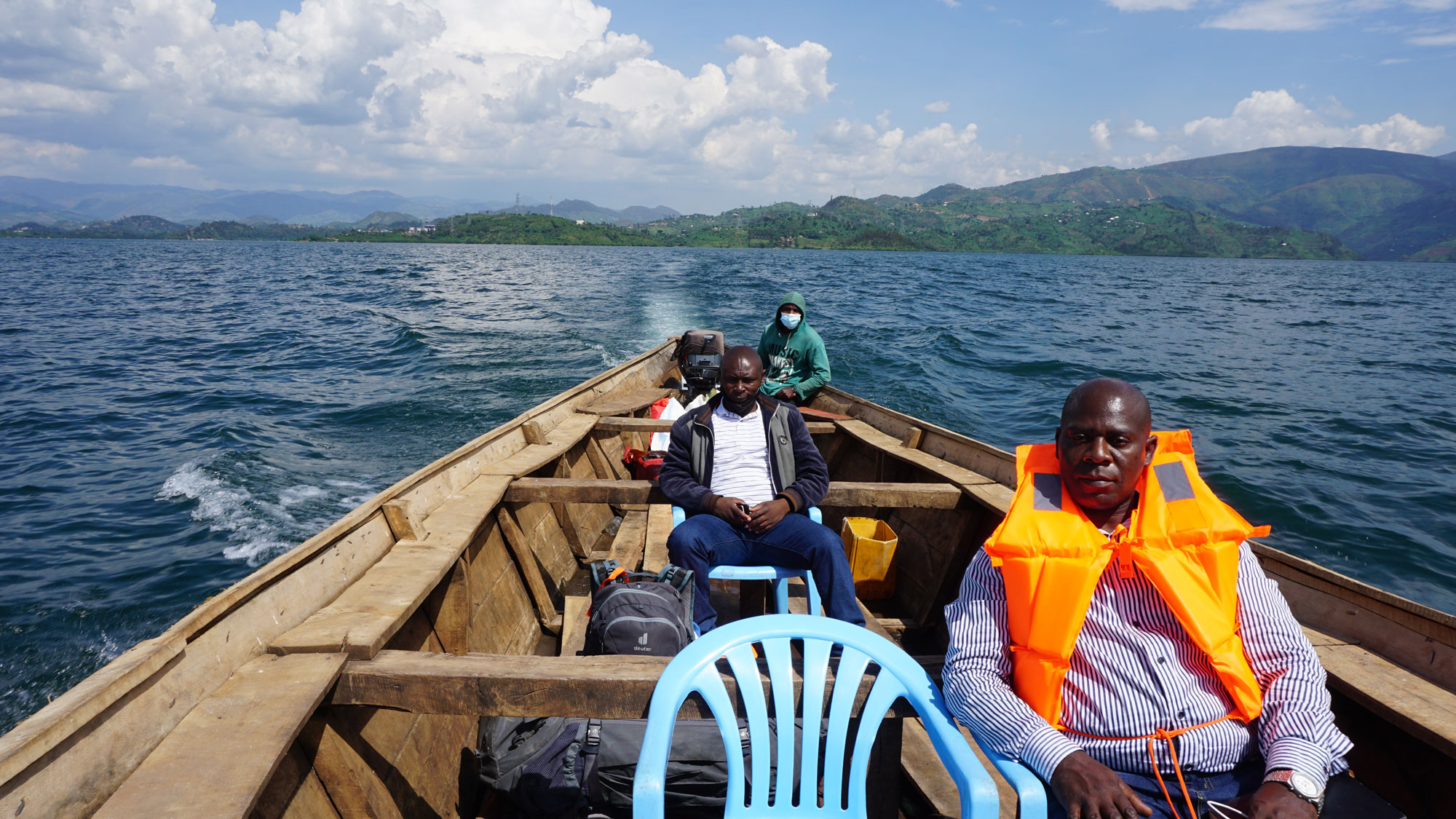
Arrival on Idjwi
We were greeted by staff members of the cooperative. Gilbert shared our adventure with everyone we met. My awkward joke that I had come for “washed coffee” and didn’t want to be washed myself particularly amused Gilbert. His cheerful, warm, and kind-hearted nature impressed me immediately. I was picked up by staff members of the coffee cooperative SCPNCK with a motorcycle to take me to the hotel. There were no paved roads on Idjwi, but there were 300,000 people living here. There were few motorcycles and almost no cars on the island. Everyday life was conducted on foot. On the way, we stopped at a small “restaurant” where we ate fufu and fried fish. The national dish on Idjwi. Then we drove to the only hotel, operated by Chance Rwesi, the deputy and right-hand man of Gilbert in the cooperative, and his wife. He had taken the risk of opening a hotel with the backing of the cooperative and with Gilbert’s help. All visitors and “important” people were accommodated and well taken care of there. It’s worth a recommendation on Tripadvisor! The house was one of the few solidly built houses on the entire island and had only recently been constructed. Grateful and exhausted from the boat ride, I took a shower and spent my first night on Idjwi.
Welcome to SCPNCK
The next morning, I was welcomed at the center of the cooperative, where I was introduced to the various groups and presented with guest gifts. The people were very pleased with the gifts (including functional jackets from a Qoffee Qulture e.V. donation campaign), and I felt more than welcome. The positive attitude of the people of Idjwi is incredibly heartwarming. With Chance, I did a “jersey exchange,” where he received a cumpa T-shirt, and I received an SCPNCK polo shirt. We took many photos, the mood was cheerful and optimistic. The cooperative seemed to me like a meeting place where people worked together comfortably and peacefully. An important person working there on behalf of an aid organization was the so far only Congolese Q-Grader, Moses Dunia Muhindo (known as Mois). He trained individual staff members to conduct quality checks. Unfortunately, there was a very large knowledge gap among everyone, and even the simple evaluation and cupping of coffees was quite difficult for the cooperative’s employees. Fortunately, there was Moses. (Note: today, Moses works for another cooperative in Kalehe in West Kivu) We did a small cupping (there wasn’t really cupping equipment) and tasted various samples that Moses roasted on the cooperative’s sample roaster, along with samples I had brought from Germany. It was very exciting for the SCPNCK staff to try different coffees.
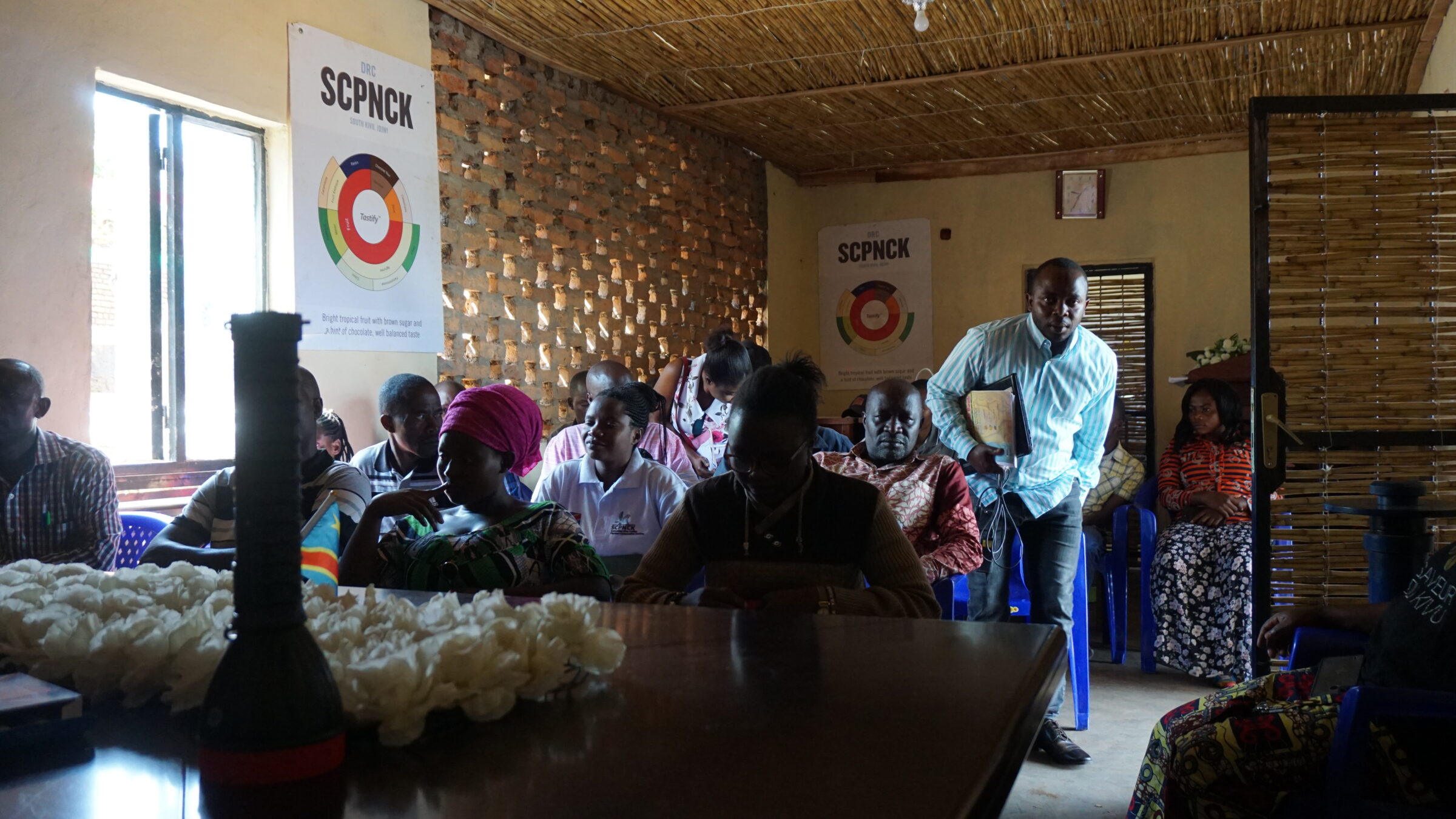
At the cooperative, there was always a communal lunch brought and distributed by a nice cook. It usually consisted of rice with beans and those small fried fish again. After lunch, Koko Clement, an employee of SCPNCK and former rebel, showed me a purchasing house of the cooperative. Here people could bring their coffee. I spent a lot of time with him, and he showed me large parts of the northern island. He only spoke French with a strong Congolese accent, like many people on the island, and unfortunately, he, like many others on the island, had an alcohol problem. I felt how he was shaped by his past as a fighter, but at the same time, I perceived him as an extremely warm and calm person. Through coffee, he had managed to break out of the cycle of violence that had previously dominated his life. With this development, Koko stood for one of the fundamental ideas of the cooperative.
On our tour, I saw that the island of Idjwi was generally densely populated, but the people lived in absolute poverty and mostly self-sufficiently. I saw few markets or other opportunities to buy food. The poverty was alarming. The people lived scattered all over the land in huts, and there were few larger settlements. Most of the huts were built along the roads. We drove past the houses to some farms and washing stations. The time with Koko made me pensive, the rides on the motorcycle behind the friendly but alcohol-smelling former rebel to the impoverished coffee farmers created a feeling of unease. But I felt that this exchange was important, and I professionally fulfilled my mission to capture stories and photos. The day ended quickly, and I fell exhausted back into bed.
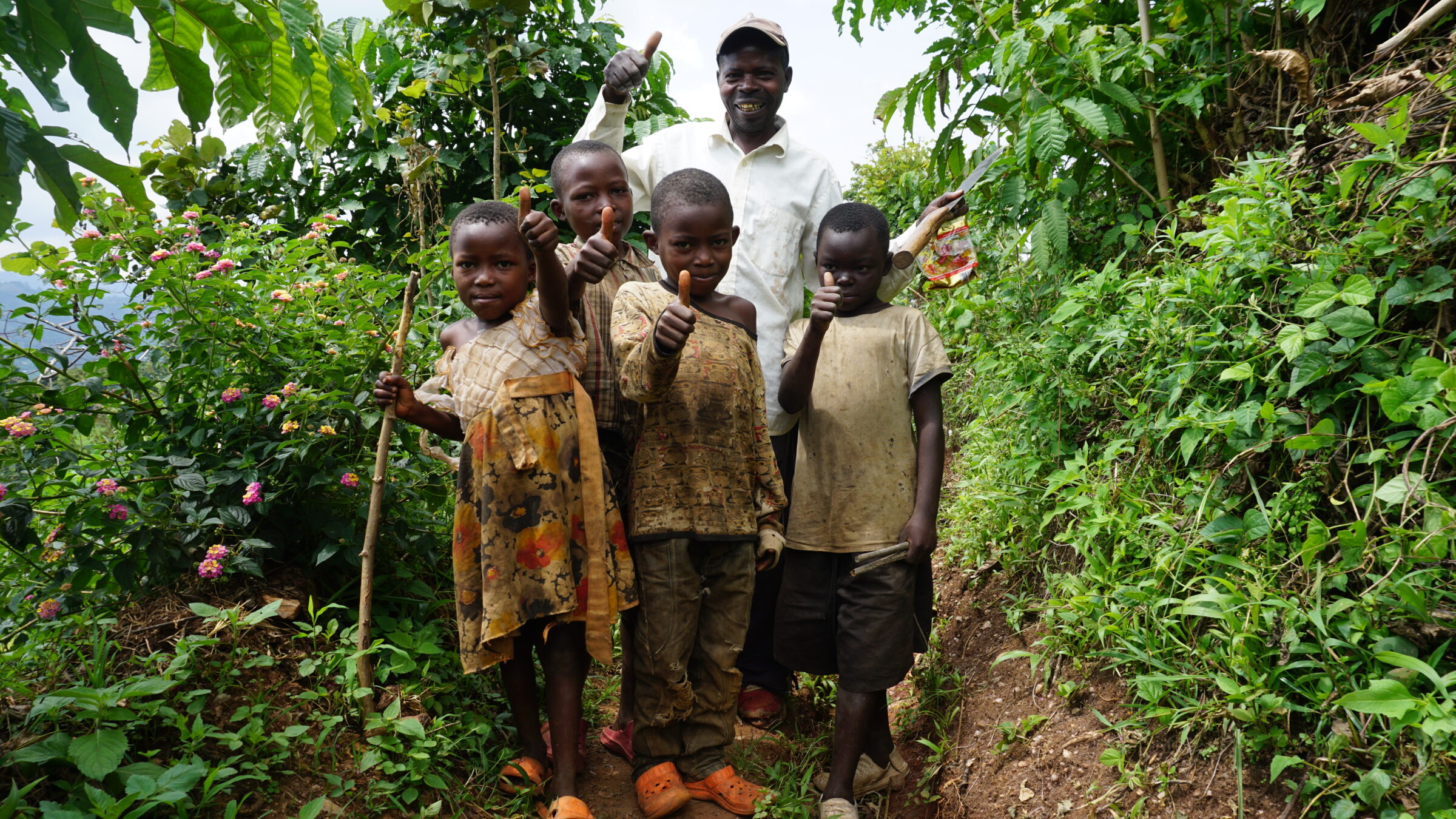
On the next day, we visited more farms and their farmers. In the afternoon, I was invited by Gilbert and the officials of the cooperative to a beer exchange in a kind of park. We told stories about each other. I learned that the authorities on Idjwi were always addressed as Mama or Papa. For example, people said “Papa Gilbert.” One lady I met told me in the evening that she had lost her husband when he drowned during a boat crossing to Rwanda. Apparently, some people from Idjwi shared this fate. In the conversations, it became clear to me once again what a big problem it is that selling coffee is so difficult. Smugglers often bought coffee from Idjwi in Rwanda and then sold it as Rwandan coffee. To bring the coffee across the lake without being noticed, many of these people drove the 20km at night in small, rudimentary, and overloaded wooden boats. If they capsized, they could not expect any help. We spent the evening sociably with conversations and beer by the lakeside.
Koko, Coffee, Coltan, and the King
On the penultimate day, I was with Koko at another washing station/wet mill called Shuve. This washing station was quite far from the cooperative center, so the coffee had to be transported by boat from there to the sorting machine. The washing stations were all set up similarly. Naturals were produced little back then. The process of choice was the classic double-washed process. The channels in which the cherries were washed were not very long, which did not allow for optimal selection. While we visited different coffee farms, I also learned about the conflict “Coltan versus Coffee.” In the DR Congo, the world’s largest deposits of coltan are suspected. Coltan is the raw material for tantalum, which is used in the capacitors of all our electrical devices. On the island of Idjwi itself, as far as I know, no large deposits are suspected. However, there were occasional finds, which led to islanders digging up coltan soil and selling it to traders in Rwanda. These excavation sites were often located on agriculturally cultivated land, including farms among coffee plants.
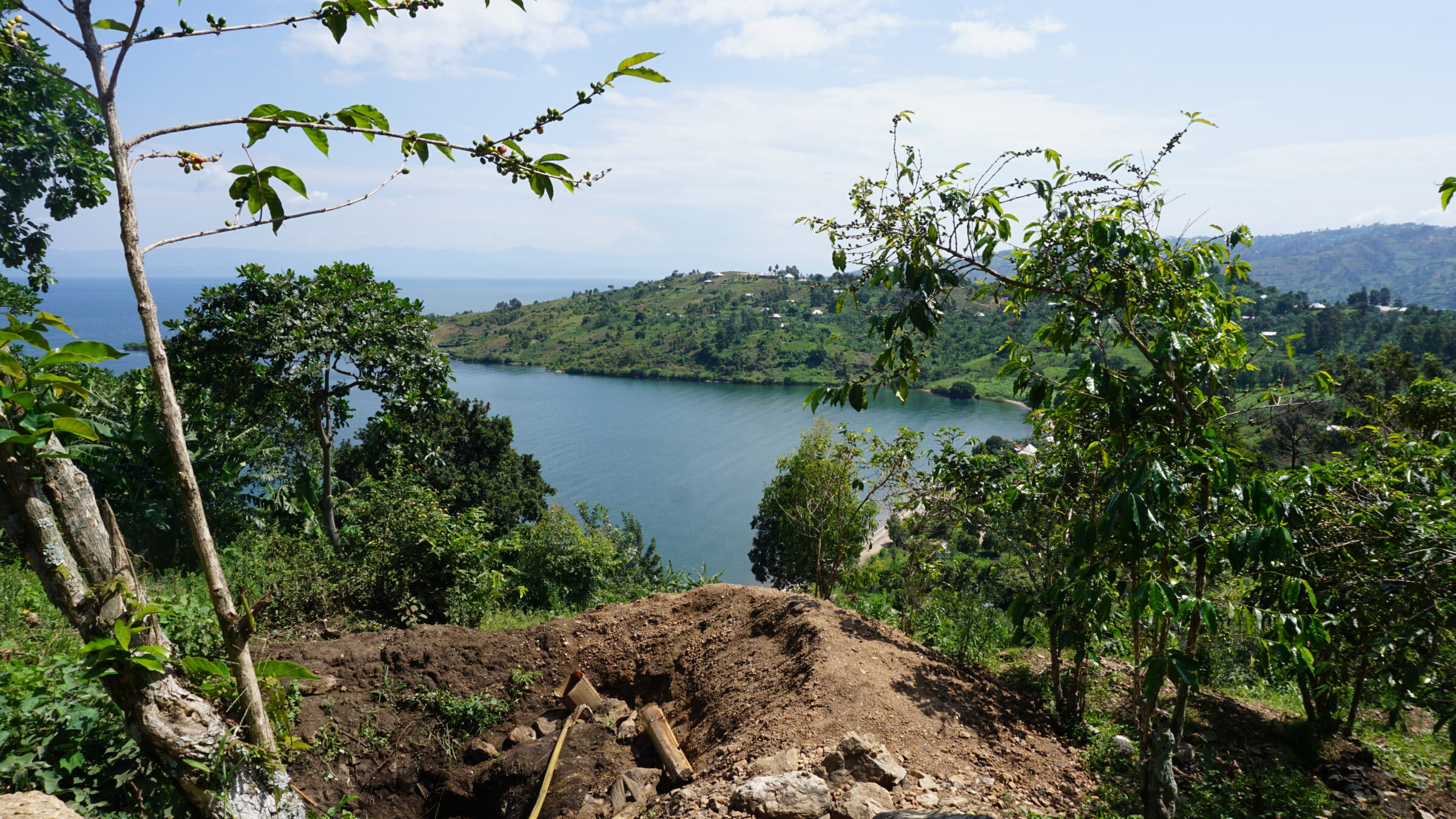
On the last day on Idjwi, Moses and I gave a course on coffee filtering to the women of the cooperative. Very little coffee was consumed on-site, and the cooperative saw it as an opportunity to open its own cafes on the island. However, there was a lack of equipment and basic knowledge. The result of our workshop was immortalized on the wall in the form of a handwritten poster. Afterwards, we visited the industrial center, which was partly operated by the water power plant of the EWB. Here, fish, various foodstuffs, and bottled fresh water were produced. The SCPNCK’s sorting machine was also located here. Unfortunately, it had been out of operation for several months due to a faulty component. Due to Covid, it was almost impossible to get the part. As a result, the cooperative had to have the coffee processed elsewhere, which led to high costs and logistical challenges. The facility had been largely paid for with Japanese aid money.
The last evening was the crowning conclusion with the special honor that I was allowed to accept an invitation from the king of the northern Idjwi kingdom. Traditionally, one had to bring a chicken to show him respect. Unfortunately, I couldn’t find one quickly, so it ended up being 50 USD in an envelope with an official cumpa sticker. Everyone was very excited that I was invited, and it was made clear to me multiple times what a privilege it was. We drank a soda in the garden of his mansion, where we were served by his servants together with Gilbert. He was a calm, strong authority with a statesmanlike demeanor. As a greeting, I had to bow and tell him that I respected him, his people, and his culture. The conversation had to be conducted only in French. Here too, in conversation with the king, it was made clear to me again what an important role Gilbert plays on the island. It was clear: he was one of the most respected people, and all the people were very grateful to him for his efforts.
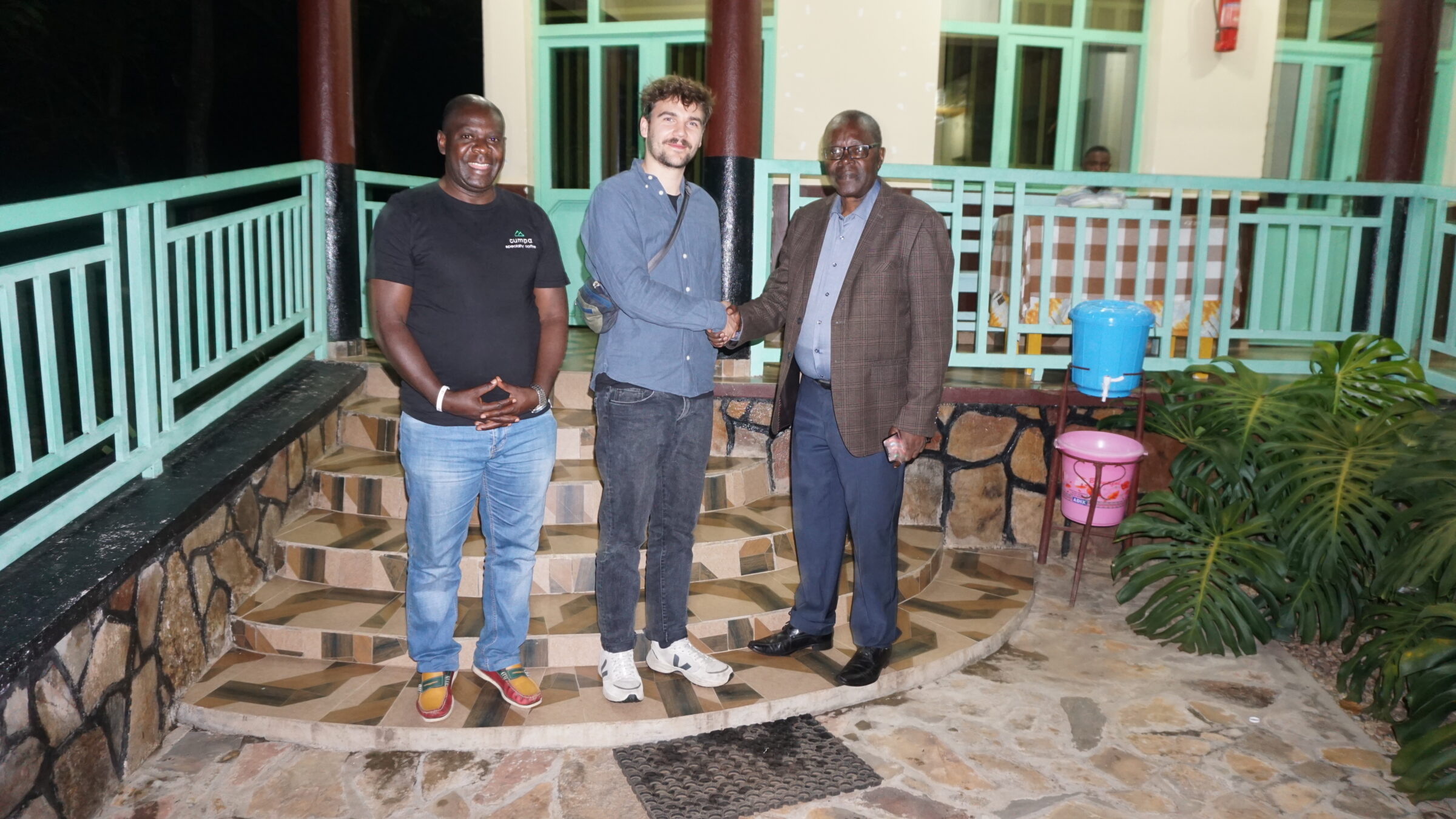
Back to Germany
I spent my last night at the hotel with Chance, trying to sleep without worrying too much about the upcoming crossing to the mainland. The next morning, I collected about a dozen empty plastic bottles and filled my backpack with them for the boat trip. If another storm were to come upon us, and if we capsized, I would be prepared and would at least have a kind of buoy with my backpack. I said heartfelt goodbyes to all the people I had come to cherish despite the short stay and nervously went to the pier for the crossing with my buoy backpack. Fortunately, my worries were unfounded, and the crossing went without a storm or incidents. In Rwanda, I went directly to Kigali, where I spent another day in the hostel to acclimatize and then traveled back to Germany.
I wrote this travel report in 2024, almost 3 years after my trip. I am extremely pleased that with cumpa, after all the efforts, we have finally managed to offer SCPNCK coffee to our customers. The plans and goals from back then, which I discussed with Gilbert, Chance, Moses, Koko, the cooperative members, and the king of Idjwi, are now coming to fruition.